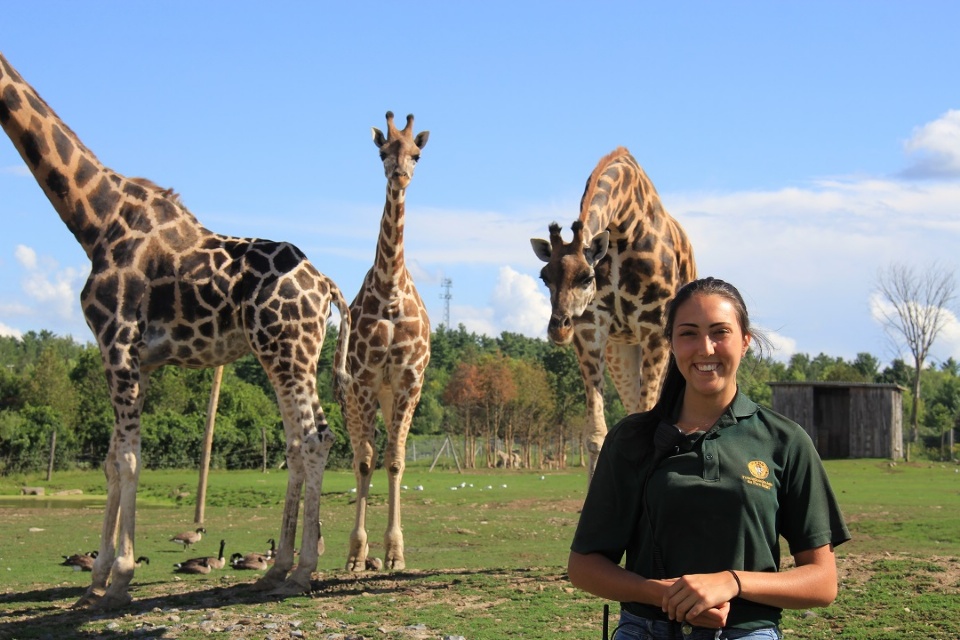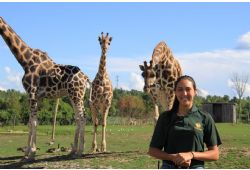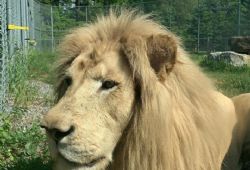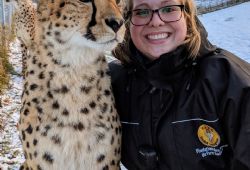It’s
dusk. As the African sun sets, casting a reddish glow on the land, two male
cheetahs are on the prowl hunting for their prey. Jabari, the bigger of the
two, spots a group of young impalas in the distance and moves silently in their
direction. Kumbe follows his brother’s lead as they approach quietly, crouched
low in the grass. When the moment is right, Jabari sprints into the open and
the group of impalas attempt to disperse in a flurry of movement.
Jabari
veers to the right, his eyes set on one particular impala. The chase is on. The
young impala, picking up speed, appears at first to outrun Jabari, but as Kumbe
rounds out from the other side, the prey is quickly cornered. After its brief
final attempt at escape, the impala is captured. Jabari carries the impala by
its neck a few feet farther to where the grass is higher. Kumbe follows. The
two brothers set themselves down on their bellies to feast – the reward for
their intense efforts.
This
event, though imagined, is seemingly ordinary. It would suggest that the
cheetah population in the wild could thrive, uninhibited by humans or other
larger animals, in its natural habitat. It would mean that Jabari and Kumbe
could survive and reproduce, thereby ensuring the survival of their species. The
current reality of cheetahs is not so simple.
That’s
why Parc Safari, in collaboration with other zoos and animal conservation
organizations across the world, has been working tirelessly on cheetah conservation
as a member of the Species Survival Plan (SSP).
The
SSP was developed by the American Association of Zoos and Aquariums in 1981 to
help ensure the survival of endangered species in the wild. Sometimes referred
to as “captive breeding”, the practice involves many moving parts and
collaborators across the world to save a species from extinction due to habitat
loss, fragmentation, over hunting or fishing, poaching, pollution or disease.
The
SSP’s goal is to ensure the survival of a species in order to repopulate in the
wild once the animals born in captivity have been properly trained to survive
in their natural habitat. The cheetah, considered the fastest land animal in
the world, is on the brink of being classified as an endangered species, with
just 7100 estimated to be alive in the wild in 2016.
Jabari
and Kumbe—born in July 2019 at Parc Safari—have been preparing and training for
their role in saving their own species. At just a year and a half old, these
brothers are about to embark on a huge mission halfway across the world. How’s that
for pressure to perform?
Why
Jabari & Kumbe?
There
are multiple reasons that have contributed to the cheetah struggling to survive
in the wild. Along with human-caused issues, cheetahs are known for not
defending their ‘kill’, which can incite other animals, such as lions or
hyenas, to steal the cheetah’s catch. Survival in the wild isn’t as simple as
one might think. It goes way beyond being able to hunt one’s own food.
One
of the key reasons cheetahs are considered a vulnerable species lies in their
genetics. Cheetahs lack genetic diversity and as a such, are often plagued with
birth abnormalities. Coupled with the fact that cheetahs are generally solitary
animals, it can be a challenge for this species to naturally find a good mate
with whom to reproduce.
Parc
Safari’s cheetah conservation program has had several successes over the past
few years, including being the birthplace of the first Quebec-born cubs in
history. According to Nathalie Santerre, Director of Zoology at Parc Safari,
only about 16-17 per cent of cheetahs in captivity actually breed, making it
all the more challenging for species conservation. “Cheetahs are highly
stressed cats and are not always easy to match up,” she says. In addition to
the lack of genetic diversity, low fertility rates in males further compound
the problem.
With
the SSP, it all starts with a genetic match. When healthy cheetah cubs are born
in captivity, their genetic makeup is tracked and analyzed with the genetics of
other cheetahs across the world to search for potential matches. When a match
is found, typically zoos will collaborate with one another to match male and
female cheetahs with the goal of producing a healthy litter, so that those cubs
may potentially be selected for special training followed by an eventual
release into a semi-wild environment to continue to reproduce with a strong
genetic backing. “It’s not just about a return to the wild. It’s about survival
of the species,” says Santerre.
In
2013, a male cheetah named Pendo from South Africa was brought to live at Parc
Safari as part of the SSP. Eventually a female match named Cleo was found who
was born at an Ontario zoo. According to Santerre, Cleo was not interested in
any of the males presented to her and was sent to Parc Safari in 2016. The hope
was that she would take to Pendo and they would produce a healthy litter from a
genetic standpoint. Thanks to the experience and expertise of zoologists such
as Violaine Garant and Julie Brunelle, Cleo and Pendo have had two litters to
date.
It
was their most recent litter in 2019—the very same that brought Jabari and
Kumbe into the world—that sent waves all the way to Africa. As it turns out,
the two brothers both qualified very high on the list of coveted
genetics to conserve the species. “It basically means that they have a very
solid lineage in terms of their overall genetics and health,” says Brunelle.
“Many cheetahs have health problems with their digestive and immune systems,
but Jabari and Kumbe really fit the markers for strong genetics.”
According
to Garant, many cheetahs only live between seven and nine years and they rarely
make it to 10 years of age. “This is why it’s so important to continue the
genetic line,” she says. “Even when they manage to mate, often the cubs may
have genetic defects and are unable to care for themselves and sometimes don’t
survive.” At Parc Safari, the zoologists may need to intervene by bottle
feeding a cub for medical reasons or if the mother is aloof.
Brunelle,
whose role consists of helping the male and female cheetahs get acquainted while
also studying the female’s behavior to asses when she’s ready to mate, says
that even if the cheetahs are a good match, there’s no guarantee that the
female will accept any of the potential male matches she is presented with.
Fortunately,
Pendo and Cleo hit it off, and Jabari and Kumbe have been selected for special
training so that they can be key players in their own species conservation. At
some point in the next few months, the two brothers will be ready for their
biggest adventure yet; heading to Africa to get to know their new home in a
semi-wild environment under the caring and watchful eyes of the SSP’s
collaborators.
Successfully
transferring Jabari and Kumbe to Africa is like hitting the reset button on a species’
genetics. Once the brothers begin to survive and thrive in their new home, they
are likely to reproduce and keep a strong genetic lineage going.
Training
& Preparation
Even
if Jabari and Kumbe have everything going for them from a genetics standpoint,
they still share a common cheetah characteristic; being picky eaters. Add to
that their fragile digestive systems and the potential for affinity with
humans…it’s just not a recipe for survival in the wild.
Much
of the training and preparation before the voyage to Africa surrounds training the
brothers on their eating habits. “We have to really prepare their digestive
system to match what they might find in the wild in Africa,” says Garant. “So,
we have to feed them entire chickens and rabbits, for example.”
Because
Jabari and Kumbe have been selected for “re-wilding”, human interaction must
remain very minimal. This is in stark contrast to some of their siblings and
cousins who have been raised by human hand. Cheetahs are typically ready to be
on their own at about 1.5 years old, as the average mothering period is between
18 and 22 months.
This
Fall, Garant and Brunelle will oversee the separation practice. Slowly, Jabari and
Kumbe will be weaned off their mother’s care as would naturally happen in the
wild. They will then receive a series of final veterinary check ups to ensure
they are ready and fit to travel to Africa.
Santerre
handles the arduous task of all the paperwork involved in the brothers’ preparation
here in Quebec and for their upcoming move to Africa. Having worked at Parc
Safari for the past 16 years, Santerre has worked with multiple species
conservation efforts. “Our goal with the cheetahs, and with all of our animals,
is to give them the best life we can,” she says. “Because the natural migration
of animals doesn’t exist anymore, genetic issues arise, so everything we do is
to help sustain a healthy population.”
By
releasing Jabari and Kumbe into a semi-wild protected environment, their
genetic lineage can strengthen the future genome pool and ultimately help the cheetah
avoid extinction. Once the brothers arrive in Africa, they will begin their
re-wilding training. They will be taught to hunt using the lure system, they
will be introduced to certain meats that we don’t have here in Canada and they
will learn to stay away from humans.
As
their keepers in Africa enlarge the space that Jabari and Kumbe can freely roam
in, they will learn to defend themselves and mark their territory. “As it’s a
semi-wild environment, there won’t be lions or leopards or other predators,”
says Garant. “They will have access to small prey that they can actually catch
on their own.”
Looking
Ahead
Garant
and Brunelle say that the two brothers—despite sharing the same coveted genes
that garnered them the prestige they currently carry—have their own unique
characteristics. Jabari is considered a fonceur and doesn’t mind the
presence of humans. He’s also the larger of the two, weighing about 90 pounds.
He’s an explorer, and his brother Kumbe is never far behind. Kumbe is more of a
laid-back, playful cat who is very curious and likes to analyse and understand everything
going on around him.
When it’s their time
to take on the mission of a lifetime, Jabari and Kumbe will be ready. African
sunsets and a whole new world await them.

 In The Latest Issue:Latest Issue:
In The Latest Issue:Latest Issue:
- A Bittersweet Farewell
- The new Laval Aquatic Co...
- The End of an Era:
Articles
Calendar
Virtual- ANNUAL TEACHER APPRECIATION CONTEST
- APPUI LAVAL
- ARTS & CULTURE
- CAMPS
- CAR GUIDE
- CCIL
- CENTENNIAL ACADEMY
- CHARITY FUNDRAISING
- CITYTV
- COSMODÔME
- COMMUNITY CONNECTIONS
- COVER STORY
- DINA DIMITRATOS
- ÉCOLE SUPÉRIEURE DE BALLET DU QUÉBEC
- EDITORIALS
- ÉDUCALOI
- EDUCATION
- EMPLOYMENT & ENTREPRENEURSHIP
- FÊTE DE LA FAMILLE
- FÊTE DU QUARTIER SAINT-BRUNO
- FAMILIES
- FESTIVAL LAVAL LAUGHS
- FÊTE DE QUARTIER VAL-DES-BRISES
- FINANCES
- GLI CUMBARE
- GROUPE RENO-EXPERT
- HEALTH & WELL-BEING
- 30 MINUTE HIT
- ANXIETY
- CHILDREN`S HEALTH & WELLNESS
- CLOSE AID
- DENTAL WELLNESS
- EXTREME EVOLUTION SPORTS CENTRE
- FONDATION CITÉ DE LA SANTÉ
- GENERAL
- HEARING HEALTH
- MESSAGES FROM THE HEALTH AGENCY OF CANADA
- MENTAL HEALTH
- SEXUALITY
- SOCIAL INTEGRATION
- SPECIAL NEEDS
- TEENS
- THE NUTRITION CORNER
- THE NUTRITION CORNER - RECIPES
- VACATION DESTINATION
- WOMEN'S FITNESS
- WOMEN'S HEALTH
- HILTON MONTREAL/LAVAL
- HOME & GARDEN
- INTERNATIONAL WOMEN'S DAY
- JAGUAR LAVAL
- LAVAL À VÉLO
- LAVAL FAMILIES TV SHOW
- LAVAL FAMILIES MAGAZINE CARES
- LAVAL URBAN IN NATURE
- LE PARCOURS DES HÉROS
- LES PETITS GOURMETS DANS MA COUR
- LEON'S FURNITURE
- LEONARDO DA VINCI CENTRE
- LFM PREMIERES
- LIFE BALANCE
- M.P. PROFILE
- MISS EDGAR'S AND MISS CRAMP'S SCHOOL
- MISSING CHILDREN'S NETWORK
- NETFOLIE
- NORTH STAR ACADEMY LAVAL
- OUTFRONT MEDIA
- PASSION SOCCER
- PARC DE LA RIVIÈRE-DES-MILLE-ÎLES
- PÂTISSERIE ST-MARTIN
- PIZZERIA LÌOLÀ
- PLACE BELL
- PORTRAITS OF YOUR MNA'S
- ROCKET DE LAVAL
- SACRED HEART SCHOOL
- SCOTIA BANK
- SHERATON LAVAL HOTEL
- SOCIÉTÉ ALZHEIMER LAVAL
- STATION 55
- STL
- SUBARU DE LAVAL
- TECHNOLOGY
- TEDXLAVAL
- TODAY`S LAURENTIANS AND LANAUDIÈRE
- TODAY`S LAVAL
- WARNER MUSIC
- THIS ISSUE
- MOST RECENT
Magazine
Hitting the Reset Button
Articles ~e 105,7 Rythme FM 4 chemins Annual Teacher Appreciation Contest Appui Laval Arts & Culture Ballet Eddy Toussaint Camps THIS ISSUE MORE...
CONTESTS Enter our contests
CONTESTS Enter our contests
CALENDAR
Events & Activities
COMMUNITY Posts Events
PUBLICATIONS Our Magazine Family Resource Directory
LFM BUSINESS NETWORK Learn more
COUPONS Click to save!
COMMUNITY Posts Events
PUBLICATIONS Our Magazine Family Resource Directory
LFM BUSINESS NETWORK Learn more
COUPONS Click to save!
SUBSCRIPTIONS
Subscribe to the magazine
Un-Subscribe
E-NEWSLETTER Subscribe to our E-newsletter Un-Subscribe
WRITE FOR US Guidelines & Submissions
POLLS Vote today!
E-NEWSLETTER Subscribe to our E-newsletter Un-Subscribe
WRITE FOR US Guidelines & Submissions
POLLS Vote today!
ADVERTISERS
How to & Media guide
Pay your LFM invoice
SUGGESTIONS Reader's Survey Suggest a Listing
LFM About Us Our Mission Giving Back Contact Us
SUGGESTIONS Reader's Survey Suggest a Listing
LFM About Us Our Mission Giving Back Contact Us
 PICK-UP LOCATIONS
Get a copy of LFM!
PICK-UP LOCATIONS
Get a copy of LFM!
TERMS & CONDITIONS Privacy | Terms
ISSN (ONLINE) 2291-1677
ISSN (PRINT) 2291-1677
Website by ZENxDESIGN







Tweet
Share